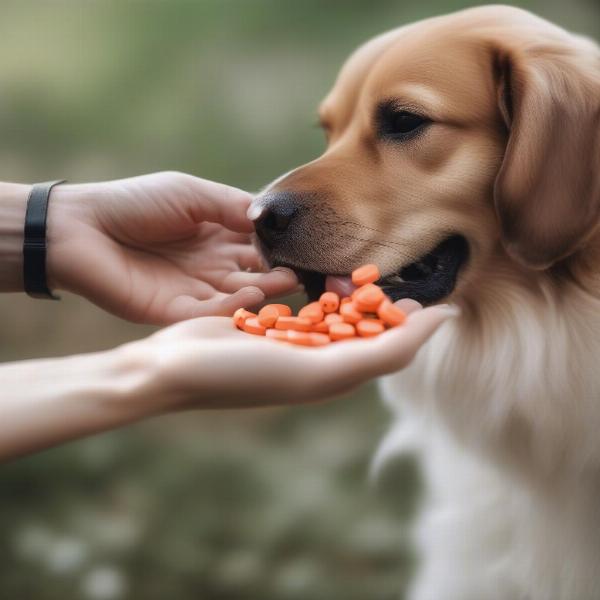Vitamins for dogs are crucial for maintaining their overall health, just as they are for humans. A balanced diet should provide most necessary nutrients, but sometimes supplementation is needed. Understanding which vitamins are essential and when to supplement them is key to responsible dog ownership. This article will delve into the importance of vitamins for dogs, covering everything from essential nutrients to potential risks of over-supplementation.
Understanding Essential Vitamins for Dogs
Vitamins are organic compounds required in small amounts for various bodily functions. They play a vital role in everything from growth and development to immune function and disease prevention. While a complete and balanced dog food should provide most of these essential nutrients, certain situations may warrant supplementation. Let’s explore some key vitamins and their benefits.
Vitamin A: Vision and Immune Health
Vitamin A is essential for maintaining good vision, a healthy immune system, and cell growth. It’s particularly important for puppies and breeding dogs.
B Vitamins: Energy and Metabolism
The B vitamin complex, including B1, B2, B3, B5, B6, B7, B9, and B12, plays a crucial role in energy production, nerve function, and red blood cell formation. These vitamins are vital for maintaining a healthy metabolism and overall well-being.
Vitamin C: Antioxidant Protection
Vitamin C is a powerful antioxidant that helps protect cells from damage caused by free radicals. It also plays a role in immune function and collagen production, which is important for healthy skin, joints, and connective tissues.
Vitamin D: Bone Health and Calcium Absorption
Vitamin D helps regulate calcium and phosphorus absorption, which are essential for strong bones and teeth. While dogs can synthesize vitamin D through sunlight exposure, supplementation may be necessary, especially for dogs with limited outdoor access.
Vitamin E: Cell Protection and Immune Support
Vitamin E is another potent antioxidant that works synergistically with vitamin C to protect cells from damage. It also supports immune function and plays a role in various metabolic processes.
Vitamin K: Blood Clotting and Bone Health
Vitamin K is crucial for blood clotting and bone metabolism. While deficiencies are rare, certain medications or health conditions can interfere with vitamin K absorption.
Recognizing Vitamin Deficiencies in Dogs
Vitamin deficiencies can manifest in a variety of ways, depending on the specific vitamin lacking. Symptoms can range from mild to severe and may include:
- Poor coat condition
- Loss of appetite
- Lethargy
- Weakness
- Digestive issues
- Skin problems
- Impaired growth in puppies
If you suspect your dog has a vitamin deficiency, consult your veterinarian for a proper diagnosis and treatment plan. They can perform blood tests to determine if supplementation is necessary and recommend the appropriate dosage and type of vitamin supplement.
Choosing the Right Vitamins for Your Dog
multi vit for dogs When choosing vitamins for your dog, it’s essential to select high-quality products from reputable brands. Look for supplements specifically formulated for dogs, as human vitamins can contain ingredients that are toxic to pets. Always follow the dosage instructions provided by the manufacturer or your veterinarian.
Multivitamins vs. Individual Supplements
Multivitamins offer a convenient way to provide a broad spectrum of nutrients. However, if your dog has a specific deficiency, individual supplements may be more effective. vitamins for dogs uk Your veterinarian can help you determine the best approach for your dog’s individual needs.
The Risks of Over-Supplementation
While vitamins are essential for health, over-supplementation can be harmful. Excessive intake of certain vitamins, particularly fat-soluble vitamins like A, D, E, and K, can lead to toxicity. Always consult your veterinarian before giving your dog any vitamin supplements, especially if they are already receiving a complete and balanced diet.
 Dog taking vitamin supplements
Dog taking vitamin supplements
Conclusion
Vitamins are vital for maintaining your dog’s health and well-being. Understanding the role of essential vitamins and recognizing potential deficiencies can help you ensure your furry friend receives the proper nutrition. multi vitamins for dogs Remember to consult your veterinarian before starting any vitamin supplements, and always choose high-quality products formulated for dogs.
FAQ
- Do all dogs need vitamin supplements? Not necessarily. A balanced diet should provide most essential nutrients. Supplementation may be needed in certain cases, such as during pregnancy, illness, or if a dog is on a restricted diet.
- What are the signs of vitamin toxicity in dogs? Signs can vary depending on the vitamin but may include vomiting, diarrhea, loss of appetite, lethargy, and increased thirst or urination.
- Can I give my dog human vitamins? No, human vitamins can contain ingredients that are toxic to dogs. Always use supplements specifically formulated for pets.
- How do I know if my dog has a vitamin deficiency? If you suspect a deficiency, consult your veterinarian. They can perform blood tests to confirm the diagnosis and recommend appropriate treatment.
- What are the best vitamins for senior dogs? Senior dogs may benefit from supplements that support joint health, cognitive function, and immune system function.
- Are there any natural sources of vitamins for dogs? Yes, certain foods are rich in specific vitamins. For example, carrots are a good source of vitamin A, and liver is rich in B vitamins. However, it’s important to ensure a balanced diet overall.
- How should I store vitamin supplements for my dog? Store supplements in a cool, dry place away from direct sunlight and moisture, as instructed on the product label.
best multivitamins for dogs uk
multivitamins for dogs
About ILM Dog
ILM Dog (https://ilmdog.com) is your trusted global resource for expert advice on dog care and nutrition. We offer comprehensive guides on breed selection, health care, training, and grooming, ensuring your canine companion thrives. Whether you’re a seasoned owner or just starting your dog-owning journey, ILM Dog provides the valuable insights you need. Contact us for personalized guidance at [email protected] or +44 20-3965-8624.